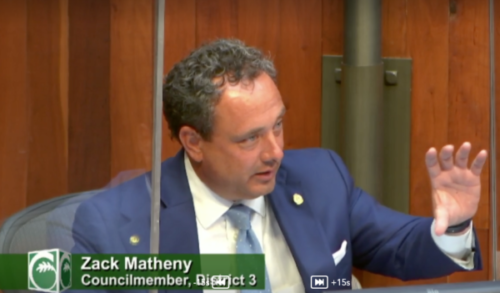Councilmember Zack Matheny was the only member of the City Council to question the 2023 legislative agenda and to question the process used to create it.
The Greensboro City Council legislative agenda is a list of bills that the City Council requests the legislature pass. The Greensboro City Council traditionally hasn’t had much success getting much of the list passed.
At the Tuesday, Feb. 7 City Council meeting, six items on the legislative were all passed by the City Council by 8-0 or 7-1 votes with Matheny casting no votes on two items. City Councilmember Yvonne Johnson was absent.
It is worth noting that the legislative agenda resolutions voted on at the meeting had been rewritten. On Tuesday afternoon, the Rhino Times posted an article, “Resolutions on City Council Agenda Have Serious Issues.” The article noted that the resolutions were written as if the 2023 session of the North Carolina General Assembly was in the future, but the legislature is currently in session. One resolution also stated that “the Greensboro City Council hereby adopts the State Housing Fund,” an action that is far beyond the authority of the City Council.
The issues brought up in the Rhino article were resolved before the meeting, but no one on the City Council mentioned that the resolutions were different from the resolutions that had been distributed in the agenda packet or that they had been rewritten only hours before the meeting.
Matheny noted that the City Council usually worked with the Greensboro Chamber of Commerce on a legislative agenda. He said that for the city to submit one legislative agenda and the chamber to submit a completely different one sent the message to the legislature that in Greensboro, “We are working in silos. The municipal government in one silo and the business community in another silo, which is the antithesis of what we talk about.”
City Manager Tai Jaiyeoba responded to Matheny’s question about working in collaboration with the chamber and said, “I don’t know how it has been done in the past by the City of Greensboro.”
Jaiyeoba also said, “I haven’t seen the chamber’s request. My understanding is that it is two or three items.”
Jaiyeoba noted that this was the first year Greensboro had an intergovernmental relations manager to work with the legislature and that one advantage was that city councilmembers would be provided with “talking points” when they went to Raleigh to lobby the legislators.
If the talking points are anything like the original legislative agenda resolutions, councilmembers may have more success in Raleigh if they leave the talking points at home.


Our City Manager has proven he also is a Master of WORD SALAD. “I don’t know how it’s been done in the past” Four Assistants and no one can review previous actions?
Glad Zack has a brain…the others have no clue.
In my precinct I voted against all of the incumbent council and mayor, and the rest of the citizens in Geekboro needs to do the same, except keep Zack. When need some new blood on the council who has some brains for the citizens, not what is currently on the council. Too many of them have their “constituents” seeking to curry favor and money from the city for their own benefit.
Term Limits – One term and others get a turn. GSO is one of the most poorly run cities in the country. Mostly all demorats.